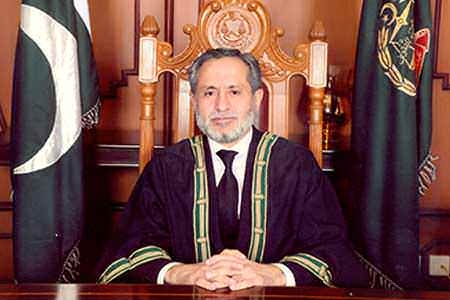- Web Desk
- Feb 19, 2026
Military courts case: Constitutional Bench laments lack of trust in courts
-

- Web Desk
- Jan 31, 2025

ISLAMABAD: The seven-member bench of the Constitutional Bench of the Supreme Court headed by Justice Aminuddin Khan resumed the hearing of civilians’ trial in military courts case.
Former Justice, Jawad S Khawaja’s lawyer, Khawaja Ahmed Hussain began his arguments from where the hearing was left yesterday. “Citizens are not subject to the Military Act,” he said, adding, “The Army Act applies to civil employees of the armed forces.”
The court asked if the Army Act applied to attacks on air bases. Justice Musarrat Hilali said, “There was an attack on APS [Army Public School, Peshawar] and a protest on May 9. What is the difference between civilians in both incidents?”
The counsel responded that the 21st Amendment was done after the APS incident.
“All civilian children were killed in the APS attack,” Justice Hilali said, to which Khawaja Hussain responded, “Our case is not outside the constitution. The May 9 people should be tried but not by the military.” He also mentioned the Pakistani Army’s statement on May 9 events that was issued on May 15.
“I have no objection to the announcement, [in which it was said] that there is irrefutable evidence of May 9,” lawyer Khawaja Hussain said, adding, “How can a fair trial be obtained in a military trial after the announcement of the Corps Commander meeting?”
Justice Hilali said that the court was informed the other day that a military trial is a fair trial.
Justice Jamal Khan Mandokhail added, “2(1)d(2) was added [to the Army Act] in 1967. Do civilians come under the Army Act under [this clause]?”
Khawaja Hussain answered, “He who is himself a victim cannot give a fair trial.”
Justice Aminuddin said, “There is an example of Indian spy Kulbhushan Yadav. In that case the Pakistani army was not the only victim. By declaring this section of the Army Act null and void, military trials will not be possible even in incidents like Kulbhushan’s.”
Khawaja Hussain said, “The Indian spy Kulbhushan was not discussed in the court decision.”
Justice Hassan Azhar Rizvi asked, “If an anti-national spy is caught in the future, where will his trial be held?”
The counsel answered, “If an anti-national spy is caught, his trial will be held in the ATC [Anti-Terrorism Court].”
The bench observed that it is strange that the Army Act section be declared null and void and it should also be said that those with special remedies are exempted. Justice Mazhar asked that if the clause is declared null and void then, “Can the Army use the Section 2(1)d(2) of the Army Act in the future?”
“This is a fact, Section 2(1)d(2) will not be usable in the future,” Khawaja Hussain answered, adding, “The Army Act was not designed to conduct trial of a civilian.”
Justice Mandokhail asked, “How can they deviate from court decisions including F B Ali? Legal provisions were upheld in the FB Ali case, and that verdict was upheld in several courts.”
Justice Mandokhail said that the verdict of the 21st Amendment was given by 17 judges. “It is wrong to punish one innocent person than releasing a hundred sinners. We only have to give a verdict; only Allah can do justice,” Justice Mandokhail said.
He said that he himself has been a victim of terrorism. “A convoy of our judges was going when a bomb exploded. God forbid, if the attack had been successful, six judges would have gone. If no evidence is presented before the courts, the accused will be acquitted. Then it will be said that the judiciary has reached 250th rank. Without any evidence, the punishment cannot be given.”
Justice Rizvi added, “No one comes to testify before the courts here. Witnesses are not protected.”
The court adjourned the hearing on intra-court appeal against trial of civilians in military courts till Monday.




